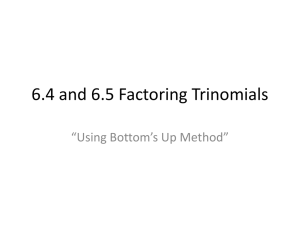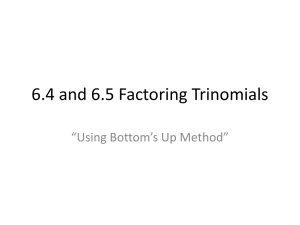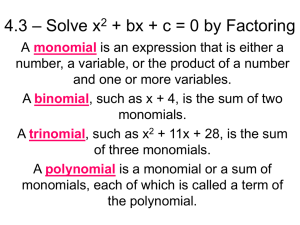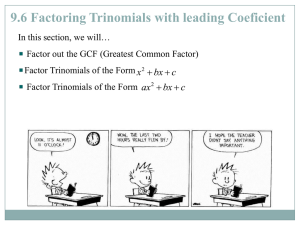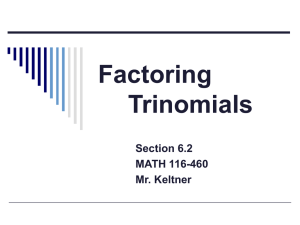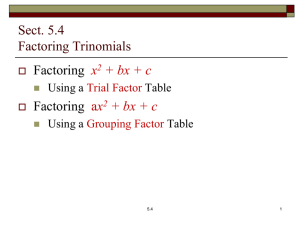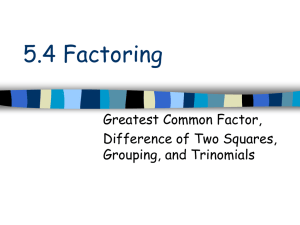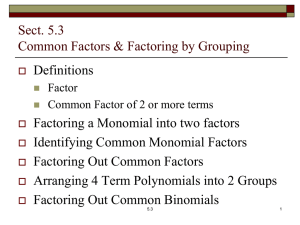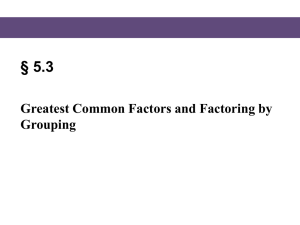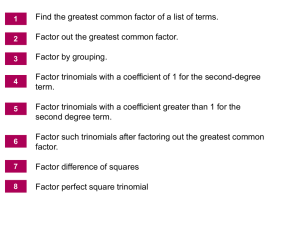Alg2 Notes 4.3 and 4.4
advertisement
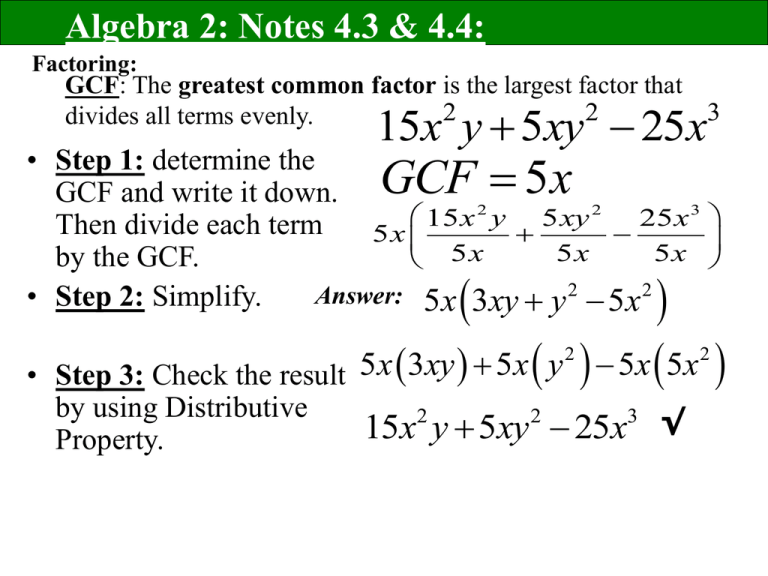
Algebra 2: Notes 4.3 & 4.4: Factoring: GCF: The greatest common factor is the largest factor that 2 2 3 divides all terms evenly. 15x y 5xy 25x • Step 1: determine the GCF and write it down. 2 2 3 15 x y 5 xy 25 x Then divide each term 5x 5 x 5 x 5 x by the GCF. Answer: 5x 3xy y 2 5 x 2 • Step 2: Simplify. GCF 5x • Step 3: Check the result 5x 3xy 5x y 5x 5x 2 by using Distributive Property. 15x2 y 5xy 2 25x3 √ 2 (4.3 & 4.4): Factor by Grouping (For polynomials with 4 or more terms) Step 1: Change any subtract to add the opposite and Group the first 2 terms with parentheses and the last 2 terms. Step 2: Take out a GCF for the 1st group, and for the 2nd group. Simplify. Step 3: Factor out the common parentheses. Simplify. 3x 2 x 9 x 6 3x 2 x 9 x 6 3 3 2 2 3 2 9 x 6 3 x 2 x 2 x 2 2 3 3 x 3 x Pull out a -3 instead x 2 3x 2 3 3x 2 x 2 3x 2 3 3x 2 3x 2 3x 2 3x 2 2 3 Step 4: Check with FOIL x 2 3x x 2 2 3 3x 3 2 Answer: 3x 2 x 3x3 2 x 2 9 x 6 √ (4.3 & 4.4): Factoring Trinomials • 3 ways to factor trinomials: – Area method – Guess and check method – Table method (4.3 & 4.4): Factoring Trinomials: Area Method • Step 1: Write the x2 term and the constant term in the diagonal rectangles. • Step 2: Multiply down this diagonal. • Step 3: Ask yourself, what two numbers can you multiply to get this and add to get the x term? • Step 4: Write these numbers in the empty rectangles. • Step 5: Factor the GCF out of each column and each row. • Step 6: Check your factoring. 4x2+8x+3 = (2x+3)(2x+1) 3 2x 2x 1 *=12x2 4x2 6x 2x 3 +=8x 1x*12x=12x2 1x*12x=13x 2x*6x=12x2 2x*6x=8x 3x*4x=12x2 3x*4x=7x 2x(2x)+2x(1)+3(2x)+3(1)=4x2+8x+3√ (4.3 & 4.4): Factoring Trinomials: Guess & Check • Step 1: Draw parentheses • Step 2: Fill in the missing factors to get the first term. • Step 3: Fill in the missing factors to get the last term. • Step 4: Check by FOIL. x2 + 10x + 25 ( )( ) (x )(x ) (x + 5)(x + 5) x(x)+x(5)+5(x)+5(5) x2 + 10x + 25 √ (4.3 & 4.4): Factoring Trinomials: Table Method • The Table Method incorporates both the Area Method and the Guess and Check Method. 4x2+15x+9 =(4x+3)(x+3) Step 1: Draw parentheses Step 2: Fill in the missing factors to get the first term. Step 3: Fill in the missing factors to get the last term. ( )( ( 2x )(2x ) or ( 4x )(1x ) ( 2x )(2x ) or ( 4x )(1x ) +1 ) +9 +1 +9 +3 +3 +3 +3 Step 4: Check by FOIL, if it doesn’t work retry steps 1 ( 4x +3)(1x+3)=4x(x)+4x(3)+3(x)+3(3)=4x2+15x+9√ and 2. (4.3 & 4.4): Factoring Formulas: • Difference of Squares • a2–b2=(a+b)(a–b) (only works for something squared minus something squared) • Sum of Cubes (only works for something cubed plus • a3+b3=(a+b)(a2–ab+b2) something cubed) • Difference of Cubes (only works for something cubed minus something cubed) • a3–b3=(a–b)(a2+ab+b2) (4.3 & 4.4): Summary of Factoring: • Step 1: If all terms have a greatest common factor other than one, then factor is out. • Step 2: If the polynomial has: – Four or more terms, then try the factoring by grouping method. – Three terms, then try the guess and check method. – Two terms, then try factoring using the difference of squares method, sum of cubes method, or difference of cubes method. (4.3 & 4.4): Solve by Factoring: • Step 1: Factor the polynomial. • Step 2: Set each factor equal to zero and solve. Example: 2 x x 21 0 2 x 7 x 3 0 2 2x 7 0 7 7 2x 7 2 2 7 x 2 x3 0 3 3 x 3 7 x or x 3 2 (4.3) √Points: Solve by Factoring: (4.4) √Points: Solve by Factoring: (4.3 & 4.4): Factoring Foldable Example: (4.3) √Points: Solve by Factoring (answers): (4.4) √Points: Solve by Factoring (answers):
